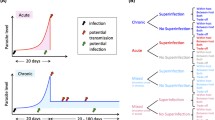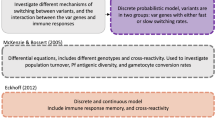Abstract
We have recently proposed a new model for antigenic variation in Plasmodium falciparum that relies on a network of partially cross-protective immune responses to orchestrate this complex immune evasion process. In addition to exhibiting prolonged oscillations of single variants that resemble the sequential dominance of immunologically distinct antigenic types, the model implies that a higher efficacy of cross-reactive immunity actually increases the length of infection while reducing severity of disease. Here, we analyse the behaviour of a reduced system under conditions of perfect synchrony between variants to demonstrate that these features of this system can be attributed to the antagonism between cross-reactive and variant-specific responses.
Similar content being viewed by others
References
Agur, Z., Abiri, D., van der Ploeg, L., 1989. Ordered appearance of antigenic variants of African trypanosomes explained in a mathematical model based on a stochastic switch process and immune-selection against putative switch intermediates. Proc. Nat. Acad. Sci USA 86(23), 9626–9630.
Antia, R., Nowak, M., Anderson, R., 1996. Antigenic variation and the within-host dynamics of parasites. Proc Natl Acad Sci USA 93(3), 985–989.
Borst, P., Bitter, W., McCulloch, R., Leeuwen, F.V., Rudenko, G., 1995. Antigenic variation in malaria. Cell 82(1), 1–4.
Bull, P., Lowe, B., Kaleli, N., Njuga, F., Kortok, M., Ross, A., Ndungu, F., Snow, R., Marsh, K., 2002. Plasmodium falciparum infections are associated with agglutinating antibodies to parasite-infected erythrocyte surface antigens among healthy Kenyan children. J. Infect. Dis. 185(11), 1688–1691.
Bull, P., Lowe, B., Kortok, M., Molyneux, C., Newbold, C., Marsh, K., 1998. Parasite antigens on the infected red cell surface are targets for naturally acquired immunity to malaria. Nat. Med. 4(3), 358–360.
Dodoo, D., Staalsoe, T., Giha, H., Kurtzhals, J., Akanmori, B., Koram, K., Dunyo, S., Nkrumah, F., Hviid, L., Theander, T., 2001. Antibodies to variant antigens on the surfaces of infected erythrocytes are associated with protection from malaria in Ghanaian children. Infect. Immun. 69(6), 3713–3718.
Frank, S., 1999. A model for the sequential dominance of antigenic variants in African trypanosome infections. Proc. R. Soc. Lond. B. Biol. Sci. 266(1426), 1397–1401.
Giha, H., Staalsoe, T., Dodoo, D., Roper, C., Satti, G., Arnot, D., Hviid, L., Theander, T., 2000. Antibodies to variable Plasmodium falciparum-infected erythrocyte surface antigens are associated with protection from novel malaria infections. Immunol. Lett. 71(2), 117–126.
Giha, H., Staalsoe, T., Dodoo, D., Elhassan, I., Roper, C., Satti, G., Arnot, D., Hviid, L., Theander, T.G., 1999. Overlapping antigenic repertoires of variant antigens expressed on the surface of erythrocytes infected by Plasmodium falciparum. Parasitology 119(Pt 1), 7–17.
Kinyanjui, S., Bull, P., Newbold, C., Marsh, K., 2003. Kinetics of antibody responses to Plasmodium falciparum-infected erythrocyte variant surface antigens. J. Infect. Dis. 187(4), 667–674.
Kosinski, R., 1980. Antigenic variation in trypanosomes: a computer analysis of variant order. Parasitology 80(2), 343–357.
Molineaux, L., Gramiccia, G., 1980. The Garki Project. World Health Organisation, Geneva.
Newbold, C., 1999. Antigenic variation in Plasmodium falciparum: Mechanisms and consequences. Curr. Opin. Microbiol. 2(4), 420–425.
Ofori, M., Dodoo, D., Staalsoe, T., Kurtzhals, J., Koram, K., Theander, T., Akanmori, B., Hviid, L., 2002. Malaria-induced acquisition of antibodies to Plasmodium falciparum variant surface antigens. Infect. Immun. 70(6), 2982–2988.
Recker, M., Nee, S., Bull, P., Kinyanjui, S., Marsh, K., Newbold, C., Gupta, S., 2004. Transient cross-reactive immune responses can maintain antigenic variation in malaria. Nature 429(6991), 555–558.
Tebo, A., Kremsner, P., Piper, K., Luty, A., 2002. Low antibody responses to variant surface antigens of Plasmodium falciparum are associated with severe malaria and increased susceptibility to malaria attacks in Gabonese children. Am. J. Trop. Med. Hyg. 67(6), 597–603.
Author information
Authors and Affiliations
Corresponding author
Rights and permissions
About this article
Cite this article
Recker, M., Gupta, S. Conflicting immune responses can prolong the length of infection in Plasmodium falciparum malaria. Bull. Math. Biol. 68, 821–835 (2006). https://doi.org/10.1007/s11538-005-9041-0
Received:
Accepted:
Published:
Issue Date:
DOI: https://doi.org/10.1007/s11538-005-9041-0




